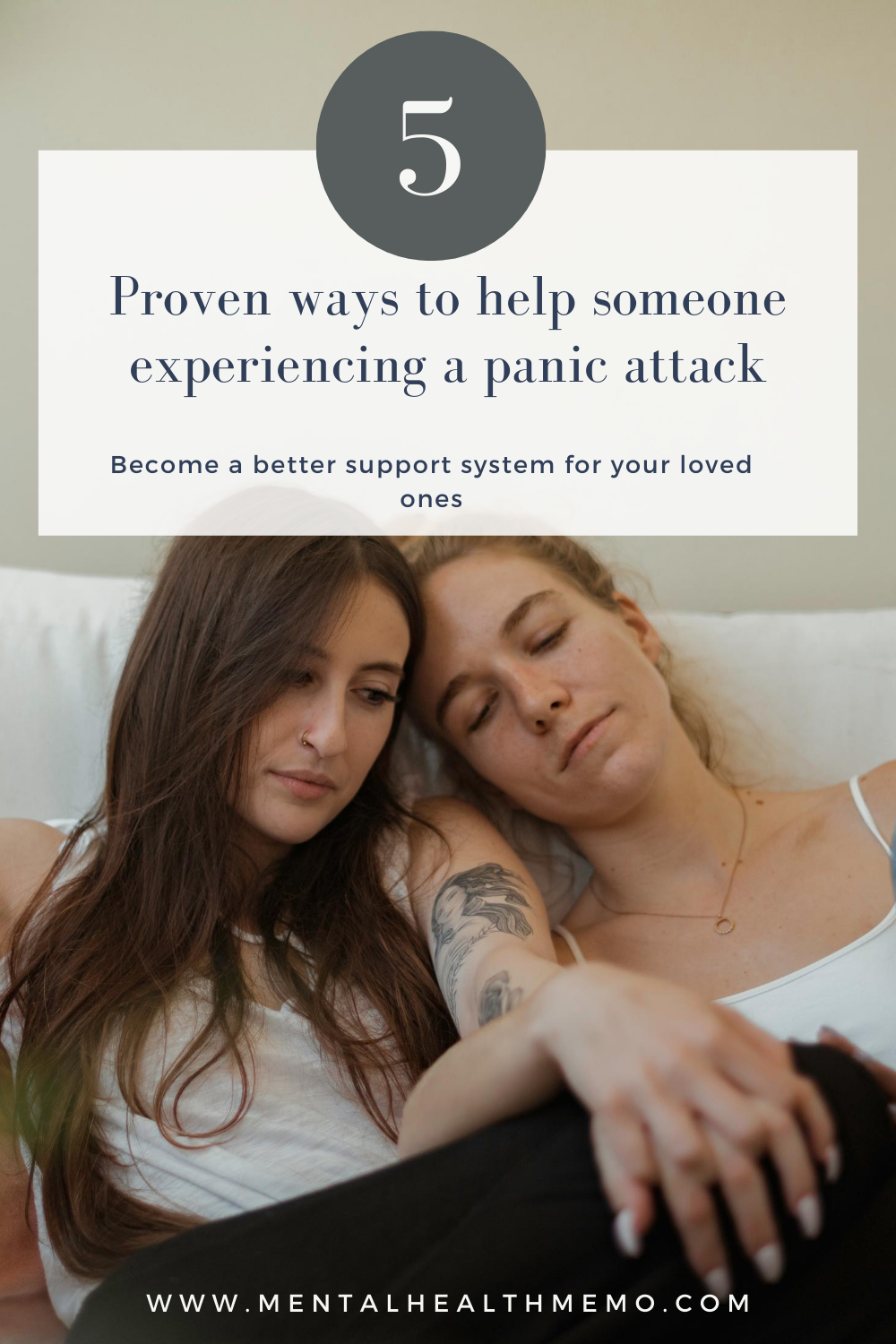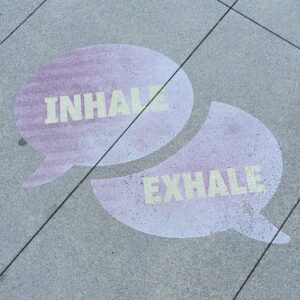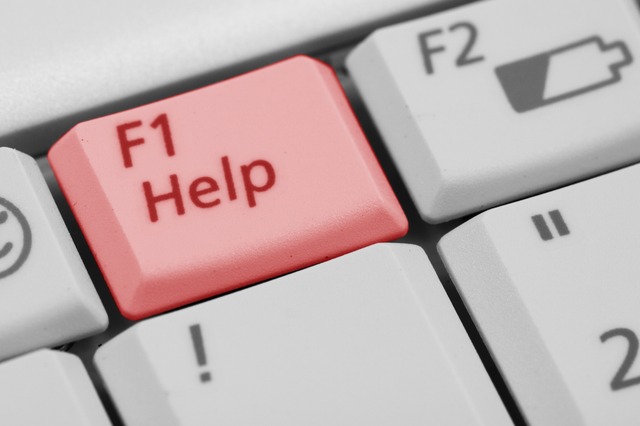Why it’s Important to Know How to Help Someone Having a Panic Attack
Anxiety and panic attacks are currently one of the most common mental health concerns experienced by the general population. And as someone who has Panic Disorder let me tell ya… panic attacks are SCARY. Both for the person experiencing the attack and the individual with them.
You get really bad physical symptoms and you honestly feel like you’re about to die: both mentally AND physically.
The good thing is that you can’t ACTUALLY die from a panic attack, which means there’s no reason you shouldn’t be able to help someone through a panic attack. So in this post I want to share with you the 5 most effective things you can do to calm someone down from a panic attack.
I also made a post about what NOT to do when someone is experiencing a panic attack, if you want to check that out first. As I mentioned in the other article, how one experiences a panic attack is very unique to them. So while what I’m saying in these posts is great as a general guideline, it doesn’t mean it’ll be necessarily right for your person.
On top of that, panic attacks and anxiety attacks are not the same thing. So this may or may not apply to someone having an anxiety attack instead of a panic attack.
Unfortunately, while there are fantastic tips for helping someone during a panic attack or an anxiety attack, it’s all very subjective and the best thing you can do if you’re stuck is to ask the person themselves.
With that in mind, let’s get straight to it!

Be Patient and Understanding
This is a really big one that makes all the difference, at least for me. It’s really hard to be having a panic attack and the person you’re with getting frustrated, and impatient.
A panic attack in its full intensity can last about 20-30 minutes, but the buildup and aftermath of a panic attack can be extensive. Usually, after I get a panic attack, I’m very susceptible to another one within the days following, and I’m super anxious and irritable.
So this is not just a quick provide-support-and-go type of situation. It’s going to take time.
This leads me to understanding. It’s such an important trait to have in general when dealing with others.
What you need to get is: I don’t want to be having the panic attack, and if I could stop it you best bet that I would. But that’s not how it works. This is an absolutely terrible experience for me much more than it is for you.
You need to understand that it’s REAL. That I’m feeling PHYSICAL sensations, and it’s not just in my head. I’m trying my BEST to make it end as fast as possible, but it’s really, REALLY hard. And once you get that, you can really practice patience and empathy.
If I feel safe, understood and not guilty for having a panic attack around you, there is a 100000% chance it’ll get better faster.
Your Demeanor (aka STAY CALM)
This is linked a bit with the previous point, but it has to do with how you’re carrying yourself in that situation.
If I’m over here panicking, and you’re there freaking out about me having a panic attack, what do you think is gonna happen? It’ll just stop because you’re also in distress now?
Nope.
It’s actually likely going to get WORSE because now you’re stressing me out even more.
So PLEASE, just stay calm.
I get the situation is difficult to cope with. But on the bright side you don’t need to be calling 911 or giving me CPR, so there’s that.
Being able to stay cool and kind is likely going to boost the success rate of ending the panic attack sooner by 80%. That is absolutely a scientific statistic. (It’s actually not). But that’s what it sure feels like to me.
The Holy Trio to Calm Down a Panic Attack
So there are three things I find are often the most helpful in making someone feel better during a panic attack: water, air, and medication
Water
Water is important because when you’re panicking you tend to get hot flashes, go numb, get a dry mouth, and sometimes vomit. So water helps to refresh and cool down the system a bit.
Another reason water is important is when you experience a panic attack, your fight, flight or freeze instincts kick start. The way we as humans have been formed is so that when this response starts, we lose all the liquid and food in our body.
That means peeing nonstop, vomiting, and passing bowels. The reason for that is once we get rid of all those things in our body, we’re lighter. If we’re lighter, we can run faster and escape whatever it is that induced the survival instinct.
Pretty wild stuff.
But the reason I say this is, the person having a panic attack is likely going to be dehydrated from all their trips to the bathroom. So drink up.
Air
Air refers to 2 things: actually going outside and getting some fresh air, but also getting out of where you currently are.
The first is important because if the person is hyperventilating or having a hard time breathing, fresh air can help refresh them and breathe easier.
Asking someone if they would like to get out of the physical space they’re in can be really beneficial. If you’re in a busy, crowded area, this could be even more vital.
I don’t know anyone who enjoys being surrounded by people while having a panic attack, so getting them somewhere more private could help ease their anxiety a bit. I know this is a big one for me, and I often opt to go somewhere in a corner or the bathroom if I’m in a packed place.
It feels a lot more comforting to be in a more isolated area where people aren’t going to stare at you or make a scene.

Medication
Medication is another really important thing to ask about. People can sometimes get so far in a panic attack they forget they even have medication or how much
to take.
You can inquire about whether the person has any, where it’s located, and then proceed to give the amount indicated on the bottle. Or let them do it if they prefer.
One thing I will say is to be mindful of how much they take.
Likely, if this is “emergency” medication they only take when they’re having a bad panic attack, it’ll be a Benzodiazepine drug. Benzodiazepines act to numb the nervous system, which is why they’re often given for panic attacks, seizures, and sleeping drugs.
They slow down the body and mind, and will often make the person taking them to feel sleepy and relatively calm.
The problem is they’re extremely addictive and can become dangerous if the person is already taking other meds such as opioids. You can also overdose on them if you take too many.
Often, people are prescribed really small quantities (around 0.5mg or 1mg) and take about 1-3 of them. Again, that’s because doctors know they’re very addictive so they keep the dosage low. They also strongly suggest you only take them when absolutely needed.
Usually, folks taking this type of medication are aware of its side effects and dangers, and how much they should be taking. But just be mindful regardless if someone is going to be taking these types of drugs!

4. Using Distractions
Personally, someone distracting me is the best way for me to feel better. Distractions can honestly be anything that is challenging enough to pull your thoughts away from the anxiety, but simple enough that you don’t just give up and start panicking again.
Ones that I find really helpful are:
- Asking someone to tell you what they’ve done throughout their day so far (try to prompt more questions as they’re sharing)
- Making them solve simple math equations
- Playing actual games like I spy or something on a phone
- Asking them lots of questions like what their interests are, what an ideal vacation would look like for them etc
You basically just want to stimulate their mind so they can’t focus on the panic. Be mindful if you start losing them, and switch it up.

5. Asking and Actively Listen
I mentioned this more in detail in the “what not to do when someone’s having a panic attack” post so I’ll keep it simple.
The easiest and most effective way to know what someone needs during a panic attack is simply to ask, and then actually listen and do what they say.
Yes, there are potential challenges if the person isn’t able to verbally communicate with you for whatever reason. However that case scenario is rare, and you can still at least try yes or no questions which can be answered by a nod or shake.
So yes, all the stuff I’ve mentioned really is effective for a lot of us, but not always. So ask and listen!
That’s about it y’all. As always, please comment and let me know if there’s something I missed that you think should be on here. I’d love to hear it!
All my love,
T

